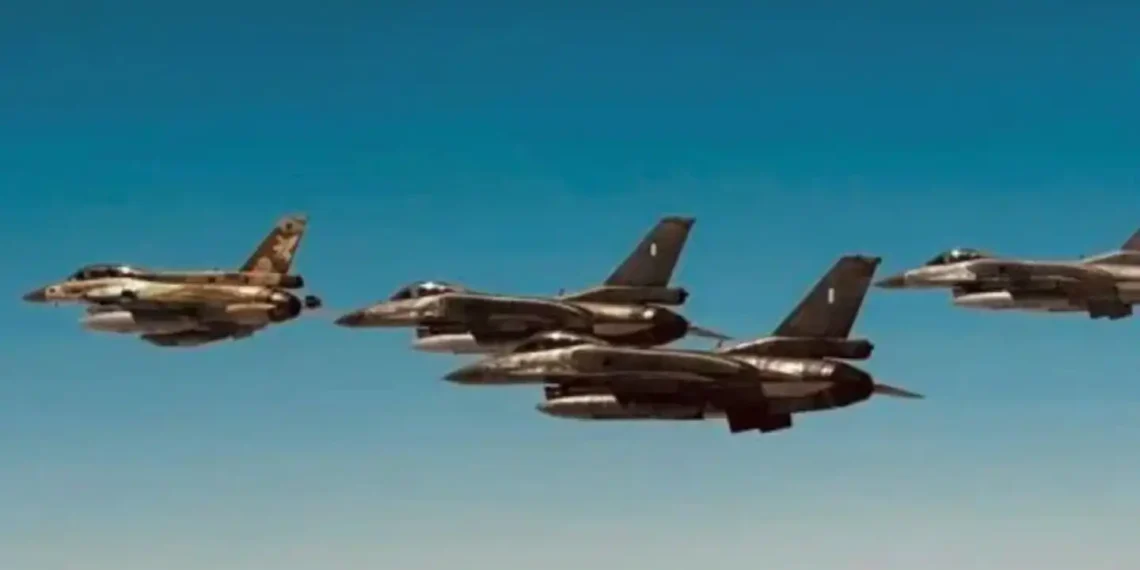Israel Launches Major Airstrike on Houthi Ports in Yemen, Dropping 35 Bombs to Cripple Terror Group’s Supply Chain
In a bold and decisive military move on Friday evening, the Israeli Defense Forces (IDF) deployed 15 fighter jets to strike key Houthi-controlled ports in Yemen. The airstrike targeted the crucial ports of Hodeidah and Salif, dropping a total of 35 bombs on these strategic sites.
The operation marks a significant escalation in Israel’s efforts to counter threats emanating from Yemen, where the Iran-backed Houthi militia has long been engaged in a brutal conflict and used the Red Sea ports to funnel weapons and supplies. According to an IDF source, the primary objective was to damage the Houthis’ main revenue streams and to impose what amounts to a naval blockade on the group.
Targeting the Houthis’ Lifeline: Hodeidah and Salif Ports
Hodeidah and Salif are not just ordinary ports—they serve as critical hubs through which the Houthis import military equipment and supplies, often smuggled in from outside the region. These supplies sustain the group’s ongoing insurgency and its ability to launch missile and drone attacks across the region.
Following the airstrike, the IDF announced that vessels longer than 80 meters will no longer be able to dock at these ports, effectively blocking larger shipments and cutting off a vital artery for the Houthis. This move is expected to severely restrict the group’s capacity to resupply and maintain its military operations.
The ports also play a key role in the Houthis’ financing. By damaging infrastructure and limiting the flow of goods, Israel aims to disrupt the group’s economic base, which depends heavily on trade and shipments passing through these ports.
A Response to Recent Attacks
Israel’s latest airstrike is not happening in isolation. It comes as a direct response to a surge in missile and unmanned aerial vehicle (UAV) launches targeting Israeli territory from Yemen in recent weeks. These attacks have raised alarm within Israel’s defense establishment, prompting swift and forceful retaliation.
Despite the threats, Israeli air defense systems have proven remarkably effective. The IDF reports a roughly 90% success rate in intercepting missiles fired from Yemen, thanks to advanced radar and missile defense technologies such as the Iron Dome and David’s Sling systems. Nevertheless, Israeli officials have emphasized that complacency is not an option, highlighting the ongoing need for vigilance as the threat landscape continues to shift.
Regional Implications and the Broader Conflict
The airstrike underscores the complex and volatile nature of the conflict in Yemen and its regional spillover effects. The Houthis, supported by Iran, have been engaged in a protracted war with the internationally recognized Yemeni government, backed by a Saudi-led coalition. This conflict has devastated Yemen’s civilian population and destabilized the wider region.
Israel’s intervention against Houthi infrastructure reflects growing concerns over Iran’s expanding influence across the Middle East. By targeting these supply routes, Israel aims to undercut Tehran’s proxy forces and reduce the flow of weapons that could threaten its security.
What’s Next?
While the immediate impact of the airstrike will be felt in the disruption of Houthi supply lines, the broader consequences remain to be seen. The Houthis may attempt to adapt by using smaller vessels or alternative routes, potentially escalating tensions further.
For Israel, maintaining a strong defensive posture remains a priority, with the IDF prepared to respond swiftly to any new threats. Meanwhile, diplomatic efforts to address the Yemeni conflict continue to face challenges amid ongoing violence and shifting alliances.
Summary
- On Friday evening, 15 Israeli jets struck the Houthi-controlled ports of Hodeidah and Salif in Yemen, dropping 35 bombs.
- The attack aims to impose a naval blockade by preventing vessels over 80 meters from docking, cutting off military supplies and income.
- The strike was a response to recent missile and drone attacks launched from Yemen toward Israel.
- Israel’s air defenses intercept about 90% of missiles from Yemen, but the threat remains significant.
- The operation reflects wider regional tensions involving Iran’s influence and ongoing conflict in Yemen.
This article was rewritten by JournosNews.com based on verified reporting from trusted sources. The content has been independently reviewed, fact-checked, and edited for accuracy, neutrality, tone, and global readability in accordance with Google News and AdSense standards.
All opinions, quotes, or statements from contributors, experts, or sourced organizations do not necessarily reflect the views of JournosNews.com. JournosNews.com maintains full editorial independence from any external funders, sponsors, or organizations.
Stay informed with JournosNews.com — your trusted source for verified global reporting and in-depth analysis. Follow us on Google News, BlueSky, and X for real-time updates.














